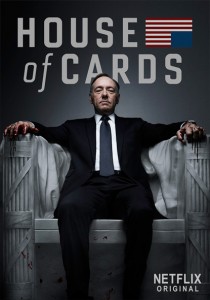TV REVIEW: HOUSE OF CARDS (Season One)
A pretty good first hand for an aspiring web series network
Netflix, having successfully slain the video store with their revolutionary DVD-by-mail business model, plans to challenge cable television by offering subscribers an exclusive line-up of streamed programming. The first original show out of the gate is House of Cards – a sophisticated one-hour drama about Washington political corruption that re-teams Oscar winner Kevin Spacey with his Seven director David Fincher. The $100 million price tag and A-list Hollywood talent lets the world know that HBO and Showtime are no longer the only destinations for premium serialized entertainment, but is House of Cards good enough to re-position Netflix as the TV network of the future? Maybe. Season One wobbles under the weight of its many ambitions, but stands on a solid foundation of satire and delicious Machiavellian power plays.
Francis Underwood, Spacey’s silver-tongued Congressman, is our tour guide through the dimly lit halls and shadowy chambers of a White House besieged by distrust and petty grievances. Frank’s got an axe to grind too. The newly re-elected President passed him over for Secretary of State, so now he’s going to mobilize a cabal of conspirators to win himself an even bigger seat in the administration. Despite frequent asides to the camera, stoic Spacey keeps his cards close to the vest. We always know what the scheming politician thinks, but rarely understand what he’s doing behind the scenes. It’s the kind of calculating antihero role the actor has always excelled at playing – a cross between tragic Shakespearean tyrant and his genteel murderer from Midnight In The Garden of Good And Evil.
All we know for certain about Frank’s plot is that it hinges on turning Peter Russo (Corey Stohl, Midnight In Paris) into governor of Pennsylvania, despite the Representative’s well-documented problem with drugs and alcohol (or is that part of the plan?). The one character on this cynical show truly deserving empathy, Russo struggles to clean up his act and become the transformational figure his blue collar constituency needs to survive a downturn economy. Hope is a rare commodity on House of Cards, but Stohl’s raw and human performance inspires it all the same.
Frank’s other key player in the game is blogger-journalist Zoe Barnes (Kate Mara, sister of Dragon Tattoo star Rooney). The Congressman feeds the cub reporter Beltway secrets, which she turns into headlines that keep Frank influential on public opinion. Another series might be tempted to sensationalize the sexual affair that springs from their mutually beneficial partnership, but House of Cards largely avoids arousing libidos. Zoe and Frank’s bedroom scenes contain no more heat than the numerous policy briefings and education bill debates that fill the man’s day planner.
I wish the other characters were more organically integrated into Frank’s schemes. Large chunks of time are devoted to trophy wife Claire (Robin Wright) making difficult choices about her overextended humanitarian organization, and flirting with having an affair of her own. I appreciate the irony of a professional do-gooder turning out to be such a callous person, but it’s a Hillary Clinton spoof that ultimately has little impact on Frank’s rise to power. There’s also a disgruntled natural gas lobbyist, a contracted call girl, a terminally ill bodyguard, and even a barbeque restauranteur. They offer great local color, but drop out of the main story too frequently to truly endear themselves.
On one hand, it’s admirable that Fincher has translated the brooding, monochromatic aesthetic of Social Network and Zodiac into a sprawling D.C. tapestry. He’s never worked with a canvas so large, and I love that he’s able to hold up a mirror to today’s obnoxious political theater and find a marathon of authentic, intimate moments that other media misses. Yet I’ve always felt that television needs to be compulsively watchable in order to sustain viewership. Cruelty can be a darkly satisfying spectacle within the confines of a two or three hour movie, but spend a full season in a reptile cage and all that cold-blooded behavior is bound to numb audience enthusiasm. The trouble is I never had a burning desire to know what happens next, particularly when outcomes rarely stray far from the most pessimistic possibilities.
Maybe it’s a good thing then that all 13 episodes of House of Card’s first season have been made available at the same time. Because every one of the show’s principals plays the long game, it takes several episodes for audiences to get hooked on their myopic power manipulations. Indeed, I wasn’t sold until Hour 6. Binge viewers can consume the low boil intrigue in a single day rather than risk losing interest in the weeks it’d take for the story to climax on broadcast TV.
Overall, this is an easy RECOMMEND for Fincher fans, political junkies, or anyone curious about where TV is heading. And it comes at a bargain when you consider Netflix’s monthly rate for unlimited streaming is comparable to the price of a matinee movie ticket. I don’t’ know if I need to chase after Spacey as he races towards the uncertain fortune of Season Two, but I’m anxious to check out the rest of Netflix’s 2013 line-up: Eli Roth’s April horror series Hemlock Grove, prison sitcom Orange Is The New Black, Ricky Gervais’ Derek, and the return of Arrested Development. It does indeed look like the revolution will not be televised, but streamed.
March 6, 2013 - Posted by Arnie C | Now Playing Podcast, Podcasts, Television | David Fincher, Kevin Spacey, Netflix, Now Playing, Review, Television
Sorry, the comment form is closed at this time.
-
Archives
- February 2021 (1)
- January 2021 (1)
- December 2020 (1)
- November 2020 (3)
- October 2020 (2)
- September 2020 (1)
- August 2020 (2)
- July 2020 (1)
- June 2020 (1)
- May 2020 (1)
- April 2020 (3)
- March 2020 (2)
-
Categories
-
RSS
Entries RSS
Comments RSS
Site info
Venganza Media GazetteTheme: Andreas04 by Andreas Viklund. Get a free blog at WordPress.com.

